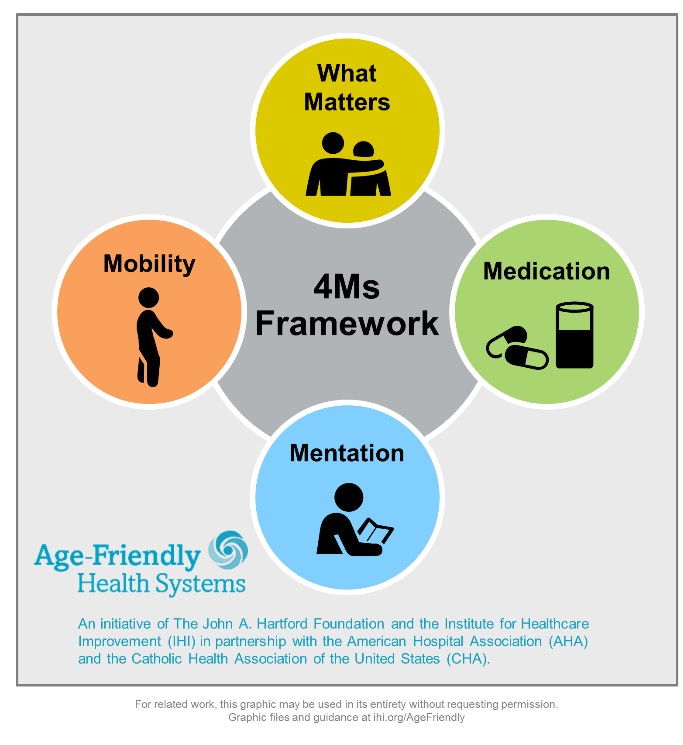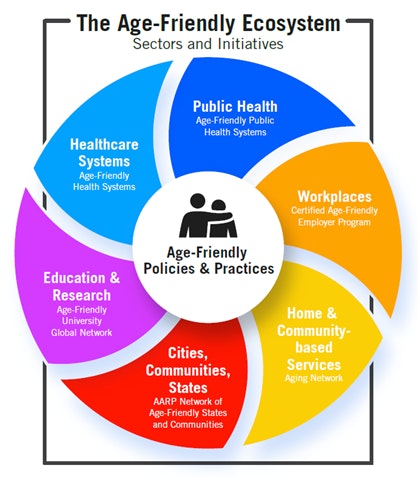National Rural Age-Friendly Initiative
The National Rural Age-Friendly Initiative is a joint effort between the National Rural Health Association and The John A. Hartford Foundation to develop resources, partnerships and strategies to build age-friendly care for the one in five older adults living in rural geographies.
Share your rural age-friendly resources with NRHA
Learn more about the Age-Friendly Ecosystem
Read NRAH's Rural Age-Friendly Ecosystem Article
Our Approach
The following four approaches are the focus of the planning phase: convenings, communications, educational activities, and community health worker trainings. Through these focus areas, NRHA is utilizing its national network of rural health experts to create a plan for implementation of the initiative.
The National Rural Age-Friendly Interest Group is a group of experts with a focus on rural health and aging formed to study research and guide NRHA’s priorities and best practices for age-friendly care in rural communities. The group guides NRHA’s rural age-friendly policy track and identifies where technical assistance is most needed. The National Rural Health Association, in collaboration with The John A. Hartford Foundation hosted two in-person National Rural Age-Friendly Initiative Interest Group meetings in 2023 during the planning grant and in 2025 during year one of the implementation grant. The Planning Grant in-person meetings were held on Monday, September 18th, 2023 and Tuesday, September 19th, 2023. The Implementation Grant meetings took place on Monday, March 17th, 2024, and Tuesday, March 18th, 2024. The Interest Group members met virtually multiple times throughout both grants, with additional meetings currently underway as the initiative continues.
NRHA disseminates rural age-friendly information through various avenues to feature age-friendly resources and best practices. NRHA has featured articles in its Rural Horizons magazine and in NRHA Today.
- 2024 Compendium of Best Practices for Rural Age-Friendly Care
- Promotoras de salud: Helping community health workers care for older adults
- A Lifespan Approach: Prioritizing Public Health for Rural Older Adults
- The Evolution and Promise of Age-Friendly Ecosystems in Rural Communities - ASA Generations
- Integrating Rural Age-Friendly Care Initiatives into States' RHTP Implementation - ASA Generations
- Age-Friendly Policy Papers Page
Through dynamic educational programming, the Initiative engages audiences at NRHA and partner conferences by highlighting progress, showcasing age-friendly resources, and sharing promising rural age-friendly best practices from across the country. The Initiative also hosts interactive rural age-friendly webinars, presents at partners' meetings, webinars, and trainings, and provides hands-on technical assistance to State Rural Health Associations (SRHAs) and State Offices of Rural Health (SORHs). To further advance rural age-friendly efforts at the state level, the Initiative awards annual rural age-friendly subaward grants to support SRHAs to integrate rural age-friendly approaches into their programs. Through this funding, 10 SRHAs have received funding to date: four in 2023, three in 2024, and three in 2025 to support rural age-friendly care.
NRHA Conferences
- NRHA’s 48th Annual Rural Health Conference: Age-Friendly Care Settings for Rural Older Adults: The National Rural Age-Friendly Initiative’s 4Ms and the CHW Training Program
- NRHA’s 47th Annual Rural Health Conference: Age-Friendly in Action in Rural Communities
- NRHA’s 46th Annual Rural Health Conference: The National Rural Age-Friendly Initiative
- NRHA’s 37th Rural Health Policy Institute: Remote Patient Monitoring Solutions to Rural Aging in Place
- NRHA’s 36th Rural Health Policy Institute: Older Americans Act Reauthorization and Rural Age-Friendly Best Practices
- NRHA’s 35th Rural Health Policy Institute: Rural Aging in Place
These webinar and training recordings showcase how community health workers, innovative rural strategies, and collaborative partnerships are strengthening connected services and advancing the Age-Friendly Ecosystem (AFE) for rural older adults.
- Connected Care for Older Adults: CHWs & Age-Friendly Care Webinar Recording
Connected Care for Older Adults CHWs & Age-Friendly Care Pilot Program
TFAH/NRHA AFPHS November Training Video - Age-Friendly Rural 2025
NRHA’s Rural Community Health Worker Training Network began in 2012 with trainings on the US-Mexico Border. NRHA has continued to expand our work with CHWs through a variety of partnerships, recognizing their profound value. As part of this Initiative, NRHA has worked with a certified CHW trainer through University of Texas at Arlington to develop a curriculum and training for rural CHWs based upon the 4Ms (see below). The team has also partnered with the Institute for Healthcare Improvement (IHI) to utilize existing materials and expertise. Through partnership with UTA, NRHA has trained 182 CHWs, both virtual and in-person, across rural and border Texas during the Planning Grant and Year 1 of the Implementation Grant to equip CHWs to deliver the 4Ms of Age-Friendly Care: What Matters, Medication, Mentation, and Mobility to rural older adults.
NRHA through the initiative has partnered with American Heart Association (AHA) to provide the HeartCorps CHW training to cohorts serving rural communities to ensure the continued inclusion of older adults in their training curriculum. To date, 85 CHWs have completed this training, with additional cohorts scheduled.
The initiative has also partnered with Oregan Health and Science University (OHSU) to host semi-annual “Project ECHO-style” webinars for PCPs/primary care teams to promote CHW integration and sustainable payment models in rural clinical settings serving older adults through their Connected Care for Older Adults program.
Compendium of Best Practices for Rural Age-Friendly Care
NRHA's 2024 Compendium of Best Practices for Rural Age-Friendly Care is a product of the collaboration with The John A. Hartford Foundation. The initiative is primarily intended to share and highlight best practices, models, research, and policies from around the United States that can be built upon in rural communities.
Further Resources:
Age-Friendly Care & Resources
Age-Friendly Health Systems is an initiative of The John A. Hartford Foundation and the Institute for Healthcare Improvement (IHI), in partnership with the American Hospital Association (AHA) and the Catholic Health Association of the United States (CHA), designed to meet the challenge of expanding Age-Friendly care head on.
Age-Friendly Health Systems aim to:
- Follow an essential set of evidence-based practices;
- Cause no harm; and
- Align with What Matters to the older adult and their family caregivers.
IHI recognizes clinical care settings that are working toward reliable practice of evidence-based interventions in the care of all older adults using the 4Ms Framework (What Matters, Medication, Mentation, Mobility). Free 7-month Action Communities are offered by IHI, AHA and others to support implementation of the 4Ms.

The four Ms of an age-friendly health center are the initial and foundational elements the systems must include to provide older adults with the best care possible
The 4Ms Framework of an Age-Friendly Health System include:
- What Matters: Know and align with each older adult’s specific health outcome goals and care preferences including, but not limited to, end-of-life care, and across settings of care.
- Medication: If medication is necessary, use Age-Friendly medication that does not interfere with What Matters to the older adult, Mobility, or Mentation across settings of care.
- Mentation: Prevent, identify, treat, and manage dementia, depression, and delirium across settings of care.
- Mobility: Ensure that older adults move safely every day in order to maintain function and do What Matters.
- Watch the "I Love Rural Health: Nemaha County Hospital Video", a heartfelt video produced by the Nebraska Rural Health Association in partnership with Nemaha County Hospital through the NRHA 2023 SRHA Age-Friendly grant funding sponsored by the John A Hartford Foundation (JAHF). The video highlights how the hospital is advancing age-friendly care by implementing the 4Ms: What Matters, Medication, Mentation, and Mobility to better serve older adults in their rural community.
Examples of age-friendly initiatives include:

- An Age-Friendly Health System utilizes the 4Ms Framework to equitably provide quality care and services to all older adults.
- Recognition can be earned through IHI and the American Hospital Association who offer free 7-month Action Communities for health care teams in any setting to join.
- IHI State-Based Guide for Transforming Health Care for Older Adults Across States (September 2025) outlines four key levers: Practice: supporting a cohort, leading an action community, leading a coalition or initiative, and Policy: championing policy change to help states and health systems implement and scale the 4Ms Framework and age-friendly health systems statewide.
Age-Friendly Public Health Systems
- Becoming an Age-Friendly Public Health System (AFPHS) means that healthy aging is elevated as a core function of a state, territorial, tribal, or local health department.
- The AFPHS Recognition Program of Trust for America’s Health is based on the 6Cs Framework and honors engagement by health departments and professionals in healthy aging.
- Learn more about How Mississippi is Changing Public Health as an example.
- Age-Friendly Universities (AFU) are a global network of higher education institutions that adopt the 10 AFU Principles.
- The Gerontological Society of America Age-Inclusivity in Higher Education Workgroup provides resources and information about becoming an AFU.
- Age-Friendly/Livable Communities are places where the policies, services, settings and structures support older people to age well across 8 domains.
- AARP organizes the Network of Age-Friendly States and Communities and you can find them here.
- IHI State-Based Guide for Transforming Health Care for Older Adults Across States (September 2025) outlines four key levers: Practice: supporting a cohort, leading an action community, leading a coalition or initiative, and Policy: championing policy change to help states and health systems implement and scale the 4Ms Framework and age-friendly health systems statewide.
Aging in Place
Aging in Place is the concept of comfortably remaining in one’s own home or community safely as you age. For many living in rural areas, having the necessary resources to do so, is a substantial challenge; further, rural areas have an overall older population, making the barriers to aging in place more urgently necessary to address. Improvements to quality of life, the level of an individuals’ independence, and decreased social isolation are only a few reasons why aging in place is a vital priority of NRHA.
Examples of barriers to aging in place include:
- Transportation: lack of public transportation, distances between services, weather, and remote homes can make daily activities increasingly challenging for older adults.
- Housing: barriers within one’s home may make it difficult to continue with daily life as aging occurs, obstacles such as stairs and unmet mobility needs must be addressed.
- Community services/ social participation: lack of availability of informal caregivers and food insecurity as well as isolation are key contributors to poor health outcomes. The ability to attend religious services, exercise, volunteer, work, and attend clubs or other activities in the community are important as you age.
- Health care: lack of access to home health care, difficulty getting to appointments, and challenges getting daily resources such as medications make it more difficult to stay in one's home.
Am I Rural?
Read the Rural Health Information Hub (RHIhub): Am I Rural? Tool - Rural Health Information Hub
Potential funding opportunities
- Search the Department of Health and Human Services grant opportunities here.
- Search the Federal Transit Administration here.
- Search RHIhub here.
Learn more about the Age-Friendly Ecosystem.
For more information, contact Rebecca Yeboah or Laura Hudson.
About The John A. Hartford Foundation

The John A. Hartford Foundation, based in New York City, is a private, nonpartisan, national philanthropy dedicated to improving the care of older adults. The leader in the field of aging and health, the Foundation has three areas of emphasis: creating age-friendly health systems, supporting family caregivers, and improving serious illness and end-of-life care.
